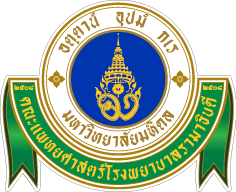Bulletin (April - June 1999 Vol.7 No.2)
DISORDRES OF TASTE
ประสาทสัมผัสของคนเรานั้นมีความสำคัญต่อการดำรงชีวิต แต่ในกรณีที่ร่างกายเกิดความผิดปกติ ซึ่งอาจเกิดจากโรค หรือการสัมผัสกับสารเคมีหรือยาบางชนิด ที่สามารถทำให้ประสาทสัมผัสบางส่วนเปลี่ยนแปลงได้ ข้อมูลต่อไปนี้เป็น การจำแนกสาเหตุที่ทำให้การได้รับรสเปลี่ยนแปลงไป ซึ่งเป็นได้ 3 ลักษณะคือ การสูญเสียการรับรสโดยสิ้นเชิง (AGEUSIA) หรือการรับรสเปลี่ยนแปลงไปไม่ตรง กับความเป็นจริง (DYSGEUSIA) และความสามารถใน การรับรสลดลง (HYPOGEUSIA)
|
DISORDRES OF TASTE |
NEUROLOGIC DISORDERS
-
Bell's palsy
-
Chorda tympani damage
-
Depressive or paranoid
-
-Delusions (infrequent)
-
FamiIial dysautonimia
|
-
Gustatory hallucinations
-
-Encephalitis
-
Epileptic aura
-
Head trauma
-
Multiple sclerosis
|
ENDOCRINE DISORDERS
-
Cushing's syndrome
-
Cretinism (phenylthiocarbamide)
-
Diabetes mellitus (sweet)
|
-
Gonadal dysgenesis (Turner's syndrome)(sour, bitter)
-
Hypothyroidism
-
Pseudohypoparathyroidism(sour, bitter)
|
LOCAL
-
Facial hypoplasia
-
Facial paralysis
-
Radiation therapy
|
-
Sjogren's syndrome
-
Tongue lesions
|
NUTRITIONAL DEFICIENCY
-
Niacin deficiency
|
-
Zinc deficiency
|
MISCELLANEOUS
-
Aging, normal
-
Aglycogeusia (sweet)
-
Burn, thermal
-
Cancer (sweet, salt)
-
Cirrhosis, liver
|
-
Hypertension (salt)
-
Laryngectomy
-
Postinfluenza
-
Renal failure, chronic
-
Smoking (bitte)
|
EFFECTS OF DRUGS
-
-
Amphetamines (sweet)
-
Amphotericin B
-
Ampicillin
-
Anesthetics, local
-
- Cocaine (sweet, bitter)
-
- Lidocaine (sweet, salt)
-
Antithyroid medications
-
- Carbamizole
-
- Methimazole
-
Aspirin
-
Azathioprine
-
Baclofen
-
Carbamazepine
|
-
Chlormezanone
-
Clofibrate
-
Diltiazem
-
Doxepin
-
Griseofulvin
-
nsulin (chronic use)(salt, sweet)
-
Levodopa
-
Oxyfedrine
-
Penicillamine
-
Phenindione
-
Phenylbutazone
-
Phenytoin
-
Sulfasalazine
|
EFFECTS OF TOXINS
-
-
Dinitrophenol
|
-
Sodium lauryl sulfate
|
